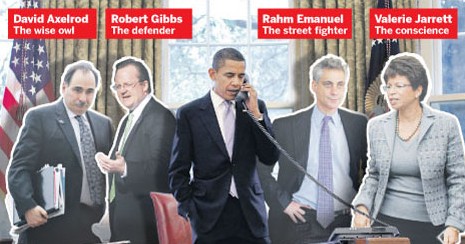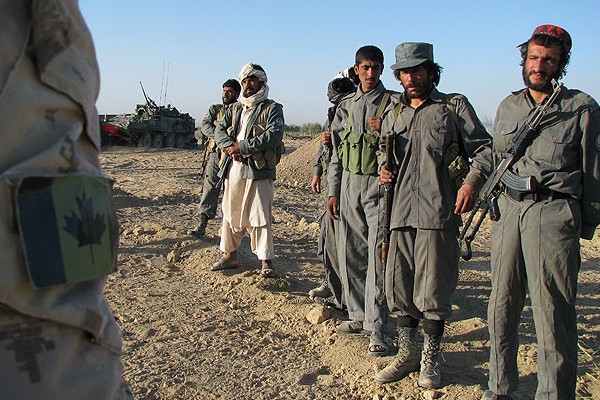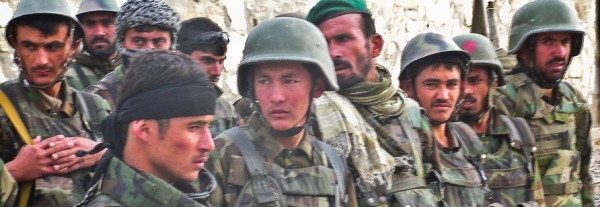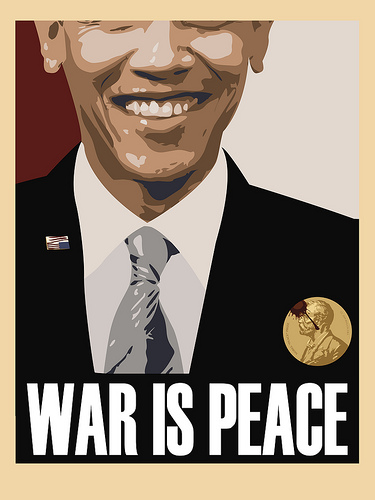The sanctity of military spending
By Glenn Greenwald, Salon, January 26, 2010
In sum, as we cite our debtor status to freeze funding for things such as “air traffic control, farm subsidies, education, nutrition and national parks” — all programs included in Obama’s spending freeze — our military and other “security-related” spending habits become more bloated every year, completely shielded from any constraints or reality. This, despite the fact that it is virtually impossible for the U.S. to make meaningful progress in debt reduction without serious reductions in our military programs.
Public opinion is not a legitimate excuse for this utterly irrational conduct, as large percentages of Americans are receptive to reducing — or at least freezing — defense spending. A June, 2009 Pew Research poll asked Americans what they would do about defense spending, and 55% said they would either decrease it (18%) or keep it the same (37%); only 40% wanted it to increase. Even more notably, a 2007 Gallup poll found that “the public’s view that the federal government is spending too much on the military has increased substantially this year, to its highest level in more than 15 years.” In that poll, 58% of Democrats and 47% of Independents said that military spending “is too high” — and the percentages who believe that increased steadily over the last decade for every group.
The clear fact is that, no matter how severe are our budgetary constraints, military spending and all so-called “security-related programs” are off-limits for any freezes, let alone decreases. Moreover, the modest spending freeze to be announced by Obama tomorrow is just the start; the Washington consensus has solidified and is clearly gearing up for major cuts in Social Security, Medicare and Medicaid, with the dirty work to be done by an independent “deficit commission.” It’s time for “everyone” to sacrifice and suffer some more — as long as “everyone” excludes our vast military industry, the permanent power factions inside the Pentagon and intelligence community, our Surveillance and National Security State, and the imperial policies of perpetual war which feed them while further draining the lifeblood out of the country. [continued…]
Obama liquidates himself
By Paul Krugman, New York Times, January 26, 2010
A spending freeze? That’s the brilliant response of the Obama team to their first serious political setback?
It’s appalling on every level.
It’s bad economics, depressing demand when the economy is still suffering from mass unemployment. Jonathan Zasloff writes that Obama seems to have decided to fire Tim Geithner and replace him with “the rotting corpse of Andrew Mellon” (Mellon was Herbert Hoover’s Treasury Secretary, who according to Hoover told him to “liquidate the workers, liquidate the farmers, purge the rottenness”.)
It’s bad long-run fiscal policy, shifting attention away from the essential need to reform health care and focusing on small change instead.
And it’s a betrayal of everything Obama’s supporters thought they were working for. Just like that, Obama has embraced and validated the Republican world-view — and more specifically, he has embraced the policy ideas of the man he defeated in 2008. A correspondent writes, “I feel like an idiot for supporting this guy.” [continued…]
Obama would ‘rather be really good one-term president’
By Mark Mooney, ABC News, January 25, 2010
President Obama, buffeted by criticism of his massive health care reform bill and election setbacks, said today he remained determined to tackle health care and other big problems despite the political dangers to his presidency.
“I’d rather be a really good one-term president than a mediocre two-term president,” he told ABC’s “World News” anchor Diane Sawyer in an exclusive interview today. [continued…]
— As though he’s in a men’s store trying out a new suit for size, Obama’s trying on the One-Termer — wants to see if he likes the cut.
If as a bold political choice this president was to make a commitment not to run for re-election, that could be a decisive way of breaking free from the stranglehold of powerful interest groups. But with this statement, as in so many others, there’s nothing bold about what Obama is doing.
Bob Herbert, who is clearly clutching hold of the last straws of hope, sees tomorrow’s State of the Union speech as an slim opportunity for the renewal of faith: “Americans want to know what he stands for, where his line in the sand is, what he’ll really fight for, and where he wants to lead this nation. They want to know who their president really is.”
This really is the most damning statement: that after one year Americans have less of a sense of who occupies the White House than they did before he took office – back when he was perceived as an unknown.
The One-Termer — Obama doesn’t need to decide whether it’s a good fit or he can afford it — they’re giving them away for free. Try it on and it’s yours for keeps.







 aving been nominated for the peace prize after only ten days in office; having spent the previous three weeks as a president-elect who silently monitored the slaughter in Gaza; and having just assumed the role of commander-in-chief in two wars, for Barack Obama to then craft a credible way to accept an accolade as this year’s most celebrated man of peace, was always going to demand some rhetorical creativity.
aving been nominated for the peace prize after only ten days in office; having spent the previous three weeks as a president-elect who silently monitored the slaughter in Gaza; and having just assumed the role of commander-in-chief in two wars, for Barack Obama to then craft a credible way to accept an accolade as this year’s most celebrated man of peace, was always going to demand some rhetorical creativity.